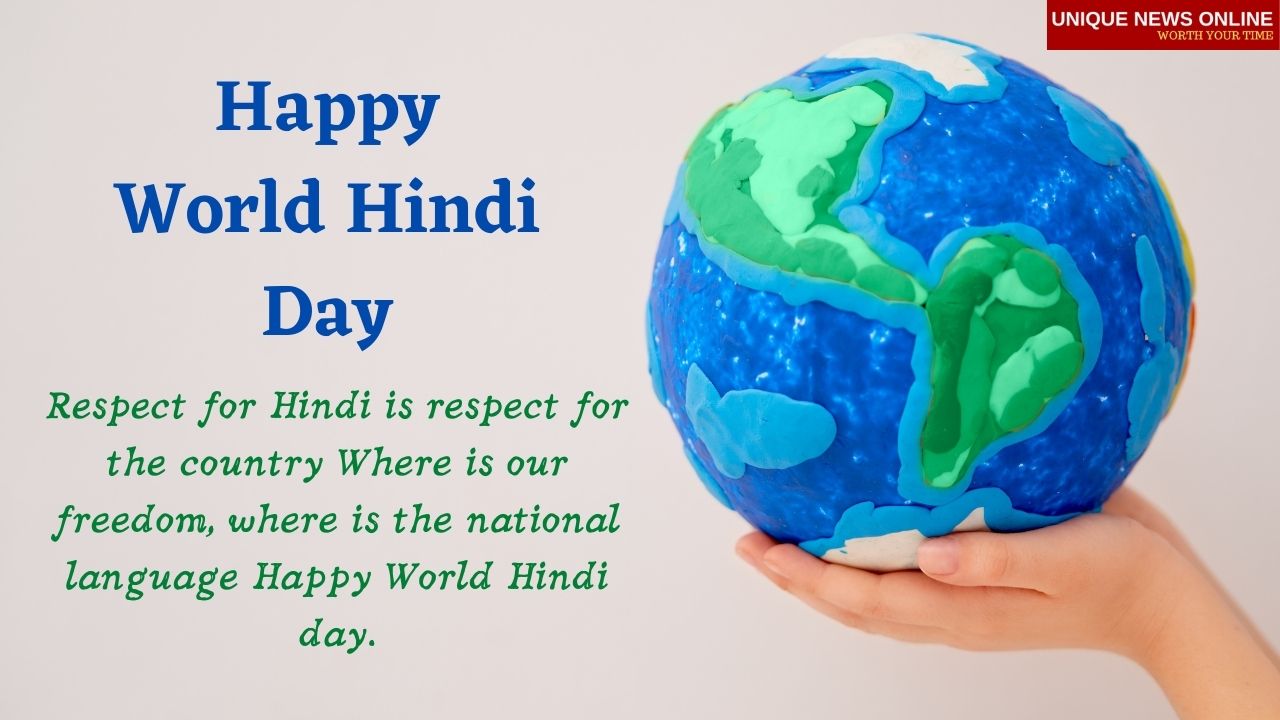


On January 10, the world celebrates World Hindi Day to recognize the cultural and linguistic unity promoted by the Hindi language. This language, spoken by a majority of India's population, holds significance beyond the country's borders as it is also a minority language in several countries. In addition to its cultural importance, Hindi is also a key language for business, diplomacy, and education, and it is increasingly being used in new technologies. With the theme of 'A Global Voice of Unity and Cultural Pride', World Hindi Day 2025 celebrates the expanding presence and influence of Hindi worldwide.
World Hindi Day: Celebrating Linguistic and Cultural Unity
World Hindi Day, observed annually on January 10th, commemorates the cultural and linguistic unity fostered by the Hindi language. Spoken by a majority of India's population, Hindi plays a significant role in education, business, diplomacy, and technology.
Background
Hindi was chosen as the official language of India in 1949, and its growth and influence have continued to grow both within the country and internationally. In 1975, the Indian government established the World Hindi Conference (WHC) to promote the language worldwide. The WHC has been instrumental in organizing World Hindi Day since 2006.
Cultural and Linguistic Importance
Hindi is the third most spoken language globally, with over 600 million native speakers. It is the official language of India and is also spoken in neighboring countries like Pakistan, Nepal, and Bangladesh. The language has a rich literary tradition, with renowned authors such as Munshi Premchand, Rabindranath Tagore, and Harivansh Rai Bachchan contributing to its heritage.
Global Reach
Hindi is not only a national but also an international language. It is spoken as a minority language in over 50 countries, including the United Kingdom, Canada, the United States, and South Africa. The Hindi diaspora has played a vital role in promoting the language globally, establishing Hindi schools, cultural organizations, and media outlets.
Theme of World Hindi Day 2025
The theme for World Hindi Day 2025 is "A Global Voice of Unity and Cultural Pride." This theme emphasizes the growing influence of Hindi worldwide and its role in fostering cross-cultural understanding and cooperation.
Top 5 FAQs and Answers
When is World Hindi Day celebrated? Answer: January 10th
What is the significance of Hindi? Answer: Hindi is the official language of India and is spoken by a majority of the population. It has a rich literary tradition and is a key language for business, diplomacy, and education.
Why was World Hindi Day established? Answer: To promote the growth and influence of Hindi worldwide.
What are the past themes of World Hindi Day? Answer: Previous themes have included "Hindi: A Bridge to the World" and "Hindi: Our Heritage, Our Pride."
How can I participate in World Hindi Day? Answer: You can participate by attending cultural events, reading Hindi literature, watching Hindi films, or learning the language.

During his maiden visit to Ethiopia, Prime Minister Narendra Modi and his counterpart Abiy Ahmed Ali announced the elevation of India and Ethiopia's relations to a strategic partnership. This move is expected to bring new depth and energy to the bilateral ties, reflecting the shared history and promising future between the two nations. The leaders also discussed issues of mutual and bilateral interest, including trade, investment, innovation, education, and defence cooperation. They also highlighted the importance of global solidarity and collaboration in the fight against terrorism.

Prime Minister Narendra Modi has arrived in Ethiopia on a two-day State Visit, the first by an Indian Prime Minister since 2011. The visit, at the invitation of Ethiopian Prime Minister Abiy Ahmed Ali, highlights the growing strategic importance of India-Ethiopia relations. PM Modi is expected to hold comprehensive discussions with Prime Minister Abiy Ahmed and meet with the Indian diaspora, while also reaffirming India's commitment to strengthening friendship and cooperation in the Global South.

The Justice Makers Bangladesh in France has strongly criticized the Muhammad Yunus-led interim government of Bangladesh for suppressing freedom of expression and adopting an authoritarian and fascistic path. This condemnation comes after journalist Anis Alamgir was arrested under the country's Anti-Terrorism Act for criticizing the government's human rights violations. The rights body has demanded the immediate and unconditional release of Alamgir and urged the international community to take action to ensure accountability and protect freedom of expression in Bangladesh.

India's remarkable economic transformation and its impact on the world stage is the focus of this e-paper. From the shifting global power dynamics to the rise of Indian businesses, this edition provides a comprehensive look at India's place in the international arena. With insights from experts, analysis of key events, and a spotlight on Indian businesses, this e-paper delivers an in-depth perspective on India's rise as a global powerhouse.

In a historic event, Indian Prime Minister Narendra Modi has been bestowed with Ethiopia's highest honour, 'The Great Honor Nishan of Ethiopia.' He is the first global leader to receive this prestigious award, which recognizes his exemplary leadership and contribution to strengthening India-Ethiopia partnership. In a ceremony held in Addis Ababa, PM Modi expressed his gratitude and dedicated the award to all those who have nurtured the bilateral ties between the two countries. This recognition marks a significant milestone in the positive partnership between India and Ethiopia, and reflects the strong bond between the two nations.

Prime Minister Narendra Modi's two-day state visit to Ethiopia has been warmly welcomed by the country's government and the Indian community. According to Tariku Deressa, CEO of Gandhi Memorial Hospital, the visit will strengthen the ties between the two nations and particularly benefit the medical industry. The cooperation between India and Ethiopia in the medical sector has been significant, with many Ethiopian doctors receiving training in Indian universities and the country importing medical equipment and products to improve the healthcare system. PM Modi's visit will further magnify these efforts and provide new opportunities for collaboration.

Indian Prime Minister Narendra Modi and Jordan's King Abdullah II bin Al Hussein met in Amman to discuss issues of mutual interest and strengthen ties between the two nations. Both leaders discussed the issue of terrorism and extremism, with PM Modi acknowledging King Abdullah II's efforts to promote moderation. The meeting also saw the signing of agreements and MOUs, paving the way for further economic cooperation and partnerships between the two nations. King Abdullah II emphasized the strong partnership and friendship between India and Jordan, expressing his enthusiasm for developing new avenues of collaboration for the benefit of their peoples.

Indian Prime Minister Narendra Modi's first full-fledged bilateral visit to Jordan in 37 years includes a meeting with Jordan's King Abdullah II to review relations and discuss ways to deepen cooperation in various sectors. During the visit, five agreements were signed, highlighting the shared commitment to combating terrorism and increasing trade and investment between the two nations. PM Modi also addressed the India-Jordan Business Forum and is now headed to Ethiopia for a two-day state visit. Follow us on Instagram for updates on Modi's trip.

In an exceptional show of hospitality, Crown Prince Al Hussein Bin Abdullah II personally drove Prime Minister Narendra Modi to the prestigious Jordan Museum. PM Modi shared pictures of the ride with His Royal Highness on social media, expressing his gratitude for the experience. The Jordan Museum is a hub for preserving and sharing the rich cultural heritage of the country, providing education and research opportunities for visitors. As PM Modi concludes his visit to Jordan, he highlighted the fruitful outcomes and strengthened collaboration between the two nations.

A terror attack at Bondi beach in Sydney, Australia has left at least 15 people dead, with 25 others still hospitalized. One of the alleged gunmen was previously investigated by Australia's national security agency, but was not deemed a threat. Vigils were held across the country to honor the victims, while the investigation now focuses on how the attackers were radicalized and the potential role of extremist ideology. The Five Eyes intelligence network will assist in the investigation as the nation's leaders vow to tighten gun laws.